Intro
Discover the potential Hydralazine side effects, including hypotension, tachycardia, and lupus-like symptoms, and learn how to manage them with proper medication and dosage.
Hydralazine is a medication used to treat high blood pressure and heart failure. It belongs to a class of drugs known as vasodilators, which work by relaxing the muscles in the blood vessels, causing them to dilate. This helps to reduce blood pressure and increase the supply of blood and oxygen to the heart. While hydralazine can be an effective treatment for these conditions, it can also cause a range of side effects. Understanding the potential side effects of hydralazine is essential for patients who are taking this medication, as well as for healthcare providers who are prescribing it.
Hydralazine has been used for many years to treat high blood pressure and heart failure, and it is generally considered to be a safe and effective medication. However, like all medications, it can cause side effects in some patients. The side effects of hydralazine can range from mild to severe, and they can vary from person to person. Some patients may experience only minor side effects, while others may experience more serious problems. In some cases, the side effects of hydralazine can be severe enough to require medical attention.
The importance of understanding the side effects of hydralazine cannot be overstated. By being aware of the potential side effects of this medication, patients can take steps to minimize their risk of experiencing problems. For example, patients who are taking hydralazine should be aware of the signs and symptoms of side effects, such as dizziness, headache, and nausea. If patients experience any of these symptoms, they should contact their healthcare provider immediately. Additionally, patients should be aware of the potential interactions between hydralazine and other medications, as well as the potential risks of taking hydralazine during pregnancy or breastfeeding.
What is Hydralazine?
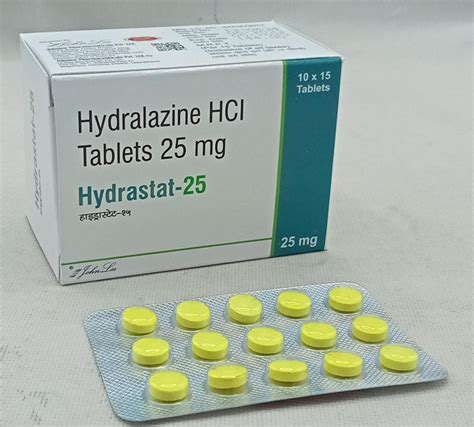
How Does Hydralazine Work?
Hydralazine works by relaxing the muscles in the blood vessels, causing them to dilate. This helps to reduce blood pressure and increase the supply of blood and oxygen to the heart. Hydralazine also helps to reduce the amount of fluid in the lungs, which can help to improve breathing in patients with heart failure. The exact mechanism of action of hydralazine is not fully understood, but it is thought to involve the relaxation of smooth muscle cells in the blood vessels.Common Side Effects of Hydralazine
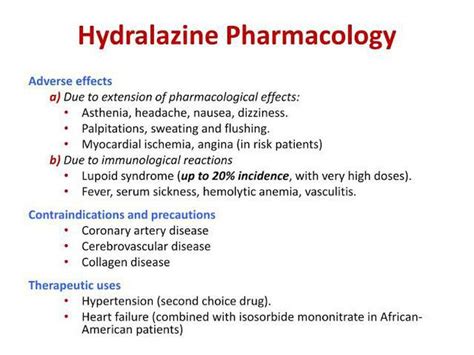
Less Common Side Effects of Hydralazine
The less common side effects of hydralazine include: * Rash or itching * Hives or urticaria * Fever or chills * Muscle pain or cramps * Numbness or tingling in the hands or feet * Changes in urine output or color * Changes in vision or hearing These side effects are usually more serious than the common side effects, and they may require medical attention.Severe Side Effects of Hydralazine
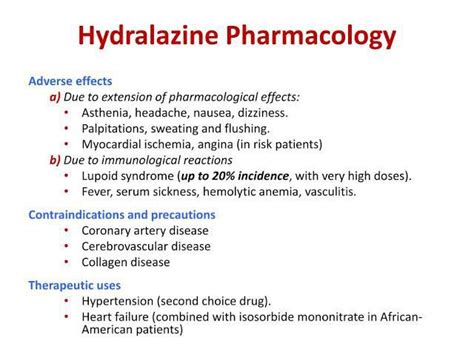
Interactions with Other Medications
Hydralazine can interact with other medications, including: * Beta blockers * Diuretics * ACE inhibitors * Calcium channel blockers * Anti-arrhythmic medications * Anti-depressant medications These interactions can increase the risk of side effects or reduce the effectiveness of hydralazine. Patients should inform their healthcare provider about all medications they are taking, including over-the-counter medications and supplements.Pregnancy and Breastfeeding
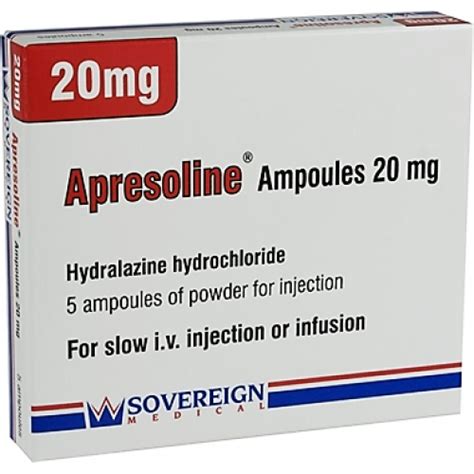
Overdose and Toxicity
An overdose of hydralazine can cause severe side effects, including: * Hypotension or low blood pressure * Tachycardia or rapid heartbeat * Respiratory depression or failure * Cardiac arrhythmias or irregular heartbeat * Seizures or convulsions * Coma or death Patients who experience any of these symptoms should seek immediate medical attention.Conclusion and Recommendations
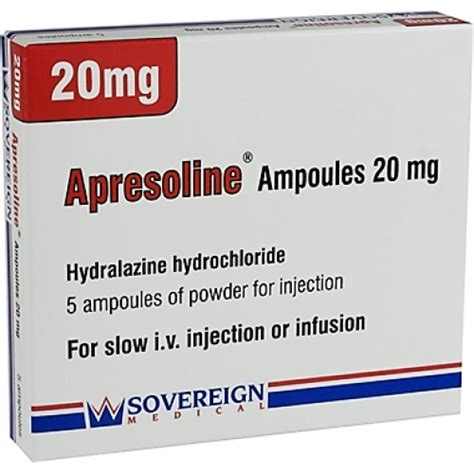
We invite you to comment below and share your experiences with hydralazine. Have you taken hydralazine for high blood pressure or heart failure? What were your experiences with the medication? Did you experience any side effects? Share your story and help others who may be considering taking hydralazine.
What is the most common side effect of hydralazine?
+The most common side effect of hydralazine is dizziness or lightheadedness.
Can hydralazine be used during pregnancy?
+Hydralazine is generally considered to be safe during pregnancy, but it should be used with caution.
What should I do if I experience a side effect from hydralazine?
+If you experience a side effect from hydralazine, you should contact your healthcare provider immediately.
